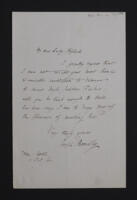Trinity College, Cambridge.—Was sorry to hear of Uncle John’s death. Hopes Kitty (his sister) was not hurt much by the swing. Has heard from Mr Heywood and seen Tovey. Romilly has died.
—————
Transcript
Coll: SS: Trin: Cantab:
Aug: 20/64
My dear Papa and Mama
I was very sorry and surprised to hear of poor Uncle John’s death. It is no wonder that you are not well. You say he was well enough the Saturday before to go to Starcross {1} and stay with Aunt Lizzie. Is it not very like what one has heard of the flicker of a candle before it goes out? I remember having noticed it in other cases. It must be a consolation to think that he had no suffering during the week, and was conscious so long. And, if I may say anything of this kind, ought we to think that the mercy which we should ourselves accord can be greater than the Infinite mercy? It seems to take away all the benefit of the Incarnation, if the Compassion of our Lord is not at least as great as that of men.
I do hope dear little Kitty was not much hurt by the swing. I know it can knock very hard, because Clement hurt his knee there very much once. I have been scratching myself in bathing. About a fortnight ago I knocked my elbow against a rough post in diving, but it is nearly well now.
I have heard from Mr Heywood, who was in Paris on the 13th, and seems to be enjoying himself. Mrs Heywood is with him, and he says they have had delightful weather. I saw Tovey in a boat last night. You will see by the Paper that Mr Romilly, one of our Dons, has just died {2}.
Please to give my love to Mitchell, and say I hope he has not lost the opportunity of making interesting experiments as to the nature of physical pain. It is such a waste of trouble if he has.
With best love to all the little ones, and hopes that you are much better, believe me to remain
your very affectionate son
+W: K: Clifford.
P:S: I have at last borrowed a machine for mending pens, and my writing is rapidly improving under its influence. You should see the two awful tables of the Inequalities of the Moon’s Radius Vector and Longitude, which I have to read over every day, so as to get them by heart.
—————
On the back of the letter are two addresses in an unidentified hand: ‘W | 59 Cannon St | London’ (‘City’ struck through before ‘London’), and ‘2 Elm Grove | New North Rd’. The latter is an address in Exeter.
{1} A village in Devon, eight miles south-east of Exeter.
{2} Joseph Romilly died of heart failure on 7 August, while on holiday at Great Yarmouth.
